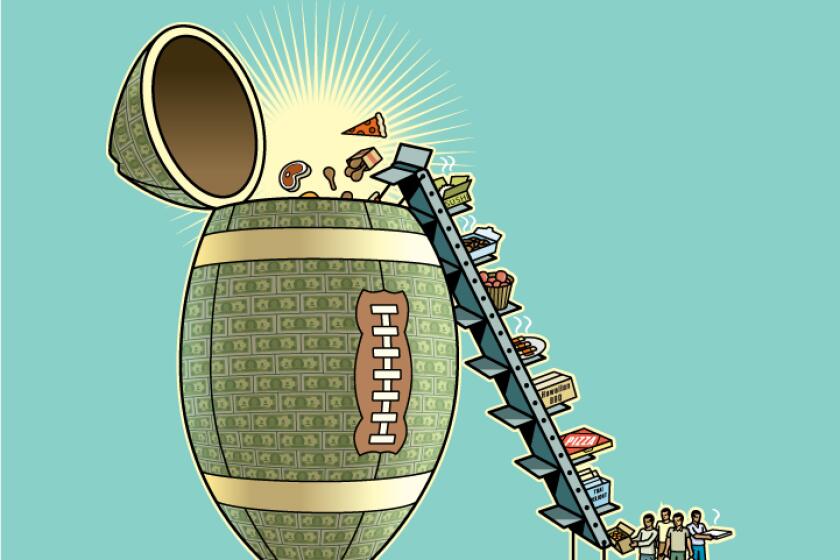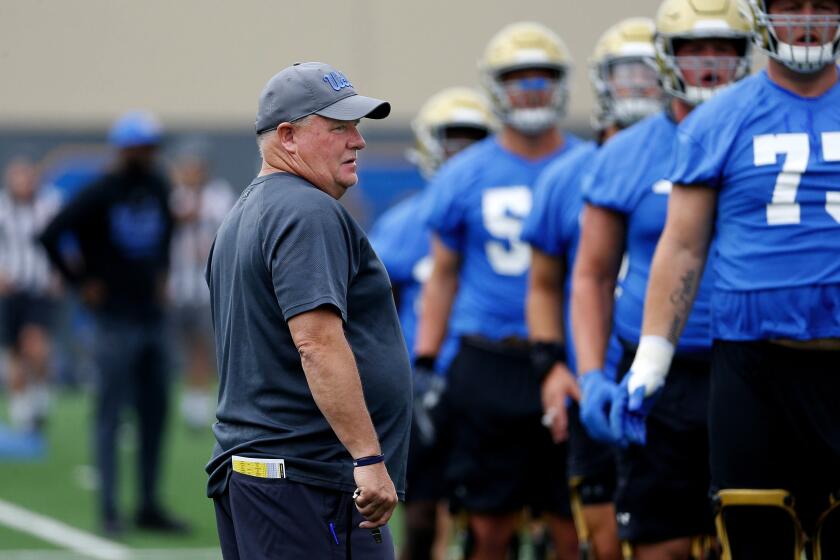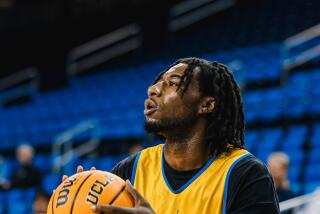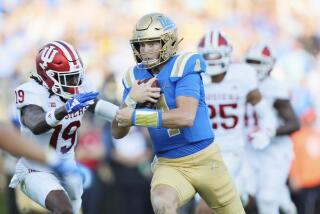In the name of the father, Paul Grattan Jr. honors a legacy at UCLA
On the day his mother told him she couldn’t afford to send him to college now that his father wasn’t around, Paul Grattan Jr. considered his options.
The eighth-grader could become a firefighter like his uncle Mike. That didn’t seem so bad, given it paired a noble endeavor with a three-day workweek. Another possibility was a trade school for some kind of blue-collar job near his Pittsburgh home.
As he moved into high school, Grattan thought more about football and the father he was named after. Paul Grattan had attended each of Little Paul’s football, basketball and baseball games, providing his own soundtrack whenever the boy pitched in Little League.
What the hell are you doing? You’re better than this! Quit walking batters!
Attempts to silence the father failed. A black tarp wrapped around the dugout fencing as part of what became known as the Paul Grattan Rule couldn’t stop the rants, and that was fine with Little Paul.
Words that might have made other parents cringe always reassured their intended recipient. Little Paul knew his father was only trying to coax the best possible performance. Besides, his father told him privately that he was the best player on the field, which reinforced his confidence.
As the centerpiece of a department facing a growing deficit, UCLA football has gorged itself on food spending that has no rival nationwide.
“He was always my No. 1 fan,” Little Paul said. “He set the standard for me that I always didn’t know that I could achieve.”
The encouragement ceased shortly before Little Paul entered high school. His father caught strep pneumonia and couldn’t fight it off, his body weakened by underlying health conditions. Paul Grattan died in 2012 at 54, leaving a void much larger than his outsized presence.
His wife, Patty, worked as an ultrasound technician at two hospitals to cover all the bills for her four children. She flatly told her only son that he wouldn’t be able to go to college without his father’s financial support.
“There was never any smokescreen about the reality of the situation after their father died,” Patty said. “My children weren’t raised in a fantasy.”
Rather than conceding defeat, Little Paul unfurled his best pitch at finding a better life, his father’s voice still resonating in his head. He dedicated himself to football, transforming from a pudgy middle schooler to a sturdy high school offensive lineman who drew interest from a slew of colleges.
On the day that Villanova offered a scholarship, the Wildcats’ recruiting coordinator told Little Paul that he had just won a quarter of a million dollars — the value of a four-year college scholarship.
Paul Grattan Jr. was going to college, all right, embarking on a journey that would bring him to UCLA this summer as a graduate transfer.
::
Paul Grattan lived his sports dreams through his children. He lost a leg when he was 12, the result of a car accident that ended any hopes of pursuing his passion for football and baseball.
His three daughters played volleyball, and ferrying them from one event to another became a year-round endeavor.
The father pushed his daughters as hard as his son. The oldest, Genevieve, abandoned sports early in high school. Olivia earned a scholarship to Quinnipiac and Caroline earned one to Temple.
Genevieve graduated from Pittsburgh with a degree in psychology, though it was a financial ordeal that required attending community college for two years, taking out loans and working her way through school.
That left Little Paul.
After Paul Grattan died, uncle Mike would show up unannounced and usher the boy out the door with three words: “OK, let’s go.” They would commence boxing workouts, Little Paul pounding a heavy bag to develop strength and coordination.
Thoughts about using his athletic gifts to earn a college scholarship started to crystallize when he watched older high school teammate Alex Bookser get wooed by Pittsburgh and go on to play in the Atlantic Coast Conference.
“He always wanted to be the best football player he could be. To make his dad proud.”
— Patty Grattan on her son, Paul Grattan Jr.
“I kind of looked up to him,” Grattan said, “and I was like, he can go to college for free, why can’t I?”
There were reasons for doubt. He barely played as a sophomore, and even after moving into the starting lineup as a junior he was largely ignored by coaches during informal workouts at college campuses.
But Grattan pushed onward, remembering that his father told him to always keep working.
“He always wanted to be the best football player he could be,” Patty Grattan said of her son, “to make his dad proud.”
The first scholarship offer came from St. Francis (Pa.), a Football Championship Subdivision school that became aware of Grattan because it had recruited a middle linebacker from his high school the previous year.
There was no longer any uncertainty about going to college.
Whatever confusion there is about Brian Norwood’s position, his goal is to help one of the nation’s worst passing defense units at UCLA.
“I was like, phew, I finally did it,” Grattan said. “But I wasn’t satisfied.”
Additional offers poured in during summer camps before his senior season. Having sprouted to 6 feet 3 and 295 pounds, he remained Little Paul in name only, overpowering counterparts in one-on-one competitions. Duquesne said it wanted him. So did William & Mary, Richmond, Toledo, Bowling Green and Buffalo.
The winning bid came after a planned detour to Philadelphia. The Grattans stopped at Villanova during a family vacation so that Little Paul could attend the Wildcats’ one-day camp. When it ended, David Riede, Villanova’s recruiting coordinator, delivered the line about him winning all that scholarship money.
“That was just mind-blowing to me,” Grattan said. “That just put it into perspective how much my athletic abilities were really worth to these people.”
::
“He’s a very quick study, has picked things up very rapidly here and we’re excited about that.”
— UCLA coach Chip Kelly on Paul Grattan Jr.
Before his first college game, Villanova versus Pittsburgh at Heinz Field in his hometown, Grattan jostled his way to the front of the pack of players preparing to race onto the field.
His not participating as part of a redshirt season made no difference in his excitement level.
“I knew I wanted to savor that moment and have that moment forever,” Grattan said, “so I pushed my way up to the front and I imagined dad in the front row of the stands just screaming his ass off.”
There would be more to celebrate in the years to come. Grattan became a three-year starter and first-team All-Colonial Athletic Assn. selection in 2019, when the Wildcats went 9-4 and advanced to the first round of the FCS playoffs.
Remembering his mantra always helped on the hard days.
I’m the best on the field. I’m going to prove it.
When he got bludgeoned, the words nudged him forward. When he played well, they encouraged him to do better. There was always a step he could have taken quicker or a play where he could have exerted more effort.
Chances of Villanova building upon its success this fall were scuttled when its conference announced it wouldn’t play amid the COVID-19 pandemic. That prompted Grattan to look elsewhere for a place to contribute in his final college season.
He found what seemed like the perfect fit in UCLA, which was scheduled to open its season in late September, ran a similar offense to Villanova and needed an experienced offensive lineman after the departure of three starters. Grattan announced on Twitter that he would become a Bruin.
Five days later, the Pac-12 Conference announced it wouldn’t play in the fall either.
“It was tough,” Grattan said with a laugh.
Hopes for one final fall season were revived in late September after the Pac-12 acquired rapid testing to detect the novel coronavirus and said it would start playing in early November.
The Bruins’ newest offensive lineman has played some with the expected starters early in training camp, impressing coach Chip Kelly with his veteran savvy.
UCLA has not reported a positive COVID-19 test in its athletic community since Oct. 2, but it needs opponents to ward off the disease as well.
“He’s a very quick study, has picked things up very rapidly here,” Kelly said, “and we’re excited about that.”
The delight has carried over to teammates who treasure Grattan’s East Coast expressions, particularly his tendency to walk into a room and say, “What’s up, ‘Cuz?” Fellow offensive lineman Josh Carlin now greets Grattan every day with his own words.
“Good morning, ‘Cuz,” Carlin will say. “Nice to see you.”
Grattan dismisses it with easy laughter. For someone who had never ventured west of the Mississippi River before this summer, he’s naturally California cool. Nothing seems to faze him given the hardships he’s endured.
“There was nothing I wanted more than for him to see me play college football,” Grattan said. “I know he’s looking down and watching me play and especially where I’m at now, I’m sure he’s bragging to all of his buddies up in heaven.”
More to Read
Go beyond the scoreboard
Get the latest on L.A.'s teams in the daily Sports Report newsletter.
You may occasionally receive promotional content from the Los Angeles Times.









